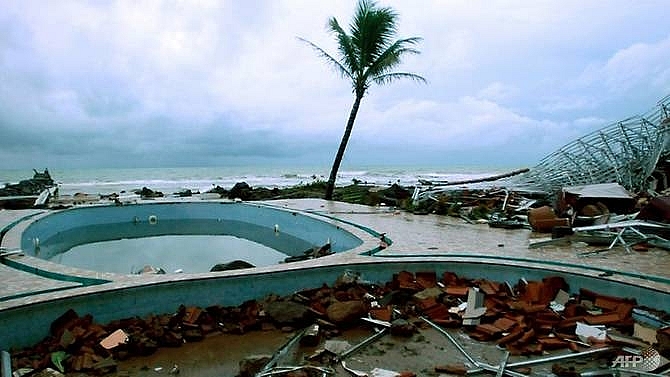Indonesia's tsunami buoy warning system not working since 2012: Official
 |
| Debris of damaged buildings is seen around a swimming pool near a beach in Anyer, Serang on December 23, 2018. (Photo: AFP/Dasril Roszandi) |
"Vandalism, lack of funds, technical faults have caused the current absence of the tsunami buoy system," said national disaster agency spokesman Sutopo Purwo Nugroho in a series of tweets.
There was no tsunami advance warning system on the night the tsunami struck, said Mr Nugroho.
He said the system had to be developed again to ensure that Indonesia had a tsunami early warning system which would be "triggered by undersea landslides and volcanic eruptions". "The absence of this system caused the failure to detect the tsunami in advance," he added.
Mr Nugroho added that Indonesia does not yet have a tsunami advance warning system that can detect undersea landslide and undersea volcanic eruption.
He cited examples of previous earthquakes which caused undersea landslides and triggered a tsunami, including the recent Palu tsunami-quake.
Currently, the country only has an advance warning system that is triggered by earthquakes.
It was first established in 2008, a few years after a 9.3-magnitude earthquake below the seabed triggered a wave that struck Banda Aceh within 15 minutes. The 2004 Indian Ocean tsunami killed 168,000 people in Indonesia alone, and left nearly 250,000 dead around the region.
Mr Nugroho added: "127 volcanoes or 13 per cent of the world’s volcanoes are in Indonesia. A number of them are undersea and are small islands that when erupt can caused tsunami."
He said this would serve as a challenge for government agencies, as well as institutes of higher learning, to develop such systems.
Other natural disasters, including landslides, volcanic eruptions, forest fires, dry weather and tornadoes also needed advanced warning systems, added Mr Nugroho.
"These will relay information to the public before disaster strikes."
More than 200 people have died with hundreds more injured from the tsunami that struck the islands of Sumatra and Java on Saturday night, according to Indonesian authorities.
Experts warn that another tsunami could strike Indonesia as volcanic activity of Anak Krakatoa continues.
What the stars mean:
★ Poor ★ ★ Promising ★★★ Good ★★★★ Very good ★★★★★ Exceptional
Related Contents
Latest News
More News
- Russian President congratulates Vietnamese Party leader during phone talks (January 25, 2026 | 09:58)
- Worldwide congratulations underscore confidence in Vietnam’s 14th Party Congress (January 23, 2026 | 09:02)
- Political parties, organisations, int’l friends send congratulations to 14th National Party Congress (January 22, 2026 | 09:33)
- 14th National Party Congress: Japanese media highlight Vietnam’s growth targets (January 21, 2026 | 09:46)
- 14th National Party Congress: Driving force for Vietnam to continue renewal, innovation, breakthroughs (January 21, 2026 | 09:42)
- Vietnam remains spiritual support for progressive forces: Colombian party leader (January 21, 2026 | 08:00)
- Int'l media provides large coverage of 14th National Party Congress's first working day (January 20, 2026 | 09:09)
- Vietnamese firms win top honours at ASEAN Digital Awards (January 16, 2026 | 16:45)
- ASEAN Digital Ministers' Meeting opens in Hanoi (January 15, 2026 | 15:33)
- ASEAN economies move up the global chip value chain (December 09, 2025 | 13:32)

 Tag:
Tag:



















 Mobile Version
Mobile Version